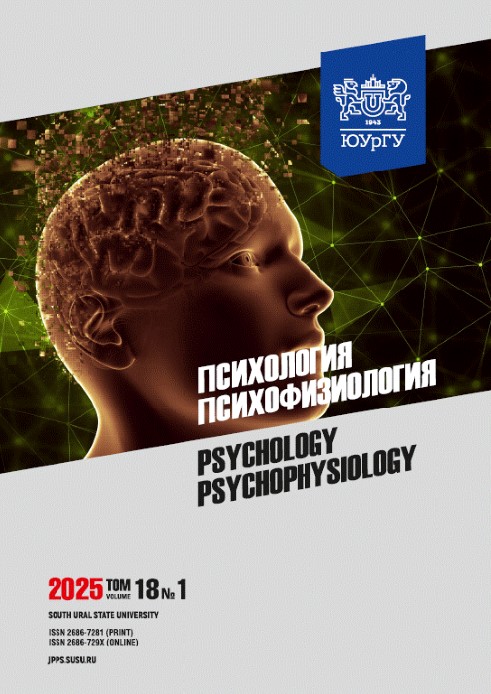The role of computerized psychodiagnostics in the educational process of sports universities: findings from a pilot study
Abstract
Introduction. The significance of this study lies in the critical importance of accounting for psychological characteristics, such as coping strategies, value orientations, and health-related behavioral patterns, within the educational training process. The application of computerized psychodiagnostics enables the precise and efficient identification of these psychological traits, which are essential for optimizing training effectiveness. Aims: this study aims to demonstrate that computerized psychodiagnostics is an effective tool for enhancing the psychological preparation of sports students, thereby supporting their athletic training. Materials and methods. A pilot study was conducted involving 6 students and 10 faculty members of the Volga Region State University of Physical Culture, Sports and Tourism. The study focused on identifying psychological characteristics conducive to effective training, with each session averaging 15 minutes in duration. Study participants were assessed using the following psychodiagnostic tools: the ways of coping checklist (R. Lazarus, S. Folkman), career anchors (E. Schein), and a life-style self-assessment. Faculty members were evaluated using the Jenkins activity survey, the psychological atmosphere in a team assessment (F. Fidler), and the level of subjective control scale (E.F. Bazhin, E.A. Golynkina, L.M. Etkind).
Results. The findings indicate that sports students predominantly employ constructive coping strategies, reflective resilience, and a positive outlook. Their primary value orientation is ‘service’, characterized by a commitment to social well-being. Students demonstrated a deliberate and conscious approach to maintaining a healthy lifestyle, underscoring the presence of strong health-oriented behavioral tendencies.
Conclusion: the study concludes that computerized psychodiagnostics is an effective technology for the psychological training of sports university students
Downloads
References
2. Tiunova O.V. Psychodiagnostics in the work of a sports psychologist with Russian national teams: content, methodological and organizational aspects // Obshchaya i prikladnaya psihologiya = General and applied psychology. 2017;2:88–93. (in Russ.).
3. Mantrova I.N. Metodicheskoe rukovodstvo po psihofiziologicheskoi i psihologicheskoi diagnostike [Methodological guide to psychophysiological and psychological diagnostics]. Ivanovo: Neurosoft. 2007:216. (in Russ.).
4. Dryagalova E.A., Kasatova E.N. Diagnostic complex for assessing the psychophysiological status of students in the process of professional self-determination. Sovremennye problemy nauki i obrazovaniya = Modern problems of science and education. 2015;2-3:148. Available at: https://s.science-education.ru/pdf/2015/2-3/130.pdf (accessed: 15.06.2024) (in Russ.).
5. Maryasova D.A., Linde E.V. Psychophysiological features of highly qualified athletes with disabilities with damage to the musculoskeletal system. Nauka i sport: sovremennye tendencii = Science and sport: modern trends. 2015;1(6):51–55. (in Russ.).
6. Gnedykh D.S. Remote computer diagnostics of the cognitive sphere of students: problems and prospects. Pedagogika i psihologiya obrazovaniya = Pedagogy and psychology of education. 2019;2:141–152. (in Russ).
7. Anufriev A.F. Development of psychodiagnostic techniques as a subject of psychodiagnostics. Pedagogika i psihologiya obrazovaniya = Pedagogy and psychology of education. 2023;4:184–200. (in Russ). DOI: 10.31862/2500-297X-2023-4-184-200
8. Barannikov A.E., Fedorova E.Yu., Pushkina V.N. The influence of typological properties of the nervous system on the level of development of motor and coordination abilities of sambo wrestlers. Estestvenno-nauchnye osnovy fizicheskogo vospitaniya i sportivnoj trenirovki = Natural science foundations of physical education and sports training. 2023;2:94–102. (in Russ.). DOI: 10.25688/2076-9091.2023.50.2.08.
9. Shibkova D.Z., Kislitsyn M.N., Maltsev V.P. Selection criteria for service sports based on the indicators of cadets of the Russian Ministry of Internal Affairs. Advances in Health Sciences Research. 2019;17:249–251
10. Egoyan А., Khipashvili I. Use of psychophysiological computer tests during the process of sportsmens preparation. Eredeti Közlemény. 2017;3:8–17.
11. Kondratovich S.V., Zakharova A.V. Age specific dynamics of response rates in football players. Theory and practice of physical culture. 2021;1:12–14.
12. Larionova O.V., Dravitsa L.V. Neurodynamic indicators of sensorimotor response of primary school children with orthophoria and heterotropy in dynamics after a course of conservative treatment. Oftalmologiya. Vostochnaya Evropa = Ophthalmology. Eastern Europe. 2022;12(3):321–332. (in Russ.) DOI: 10.34883/PI.2022.12.3.023
13. Bobrovskaya E.F. Stress and coping test by R. Lazarus and S. Folkman. Psihologiya. Seriya Poznanie = Psychology. The Cognition series. 2020;7:48–52. (in Russ.) DOI: 10.37882/2500-3682.2020.07.05
14. Shikhverdiev S.N. Career and life-meaning orientations of athletes at the stage of completion of a sports career. Uchenye zapiski universiteta imeni P.F. Lesgafta. 2021;2(192):437–440. (in Russ.). DOI: 10.34835/issn.2308-1961.2021.2.p437-440
15. Usmanova E.N., Uldanova D.R. Interdependence of indicators of the level of subjective control and the emotional sphere of team sports players aged 15-16. Pedagogiko-psihologicheskie i mediko-biologicheskie problemy fizicheskoi kultury i sporta = Pedagogical, psychological, medical and biological problems of physical culture and sports. 2020;15(4):78–83. (in Russ.).
16. Cosma G., Chiracu A., Stepan R. et al. Impact of coping strategies on sport performance. Journal of Physical Education and Sport. 2020;20(3):1380–1385. DOI: 10.7752/jpes.2020.03190.
17. Abessolo M., Flossier J. Hirschi A. Basic Values, Career orientations, and Career Anchors: Empirical investigation of relatioships. Frontiers in psychology. 2017;8:1556. DOI: 10.3389/fpsyg.2017.01556.
18. Turon-Skrzypinska A., Pawlukowska W., Szylinska A. et al. Assessment of the Relation-ship between Selected Factors and Stress-Coping Strategies in Handcyclists-A Preliminary Study. Medicina. 2020;56:211–220. DOI: 10.3390/medicina56050211
References on translit
-Copyright (c) 2025 Psychology. Psychophysiology

This work is licensed under a Creative Commons Attribution-NonCommercial-NoDerivatives 4.0 International License.



